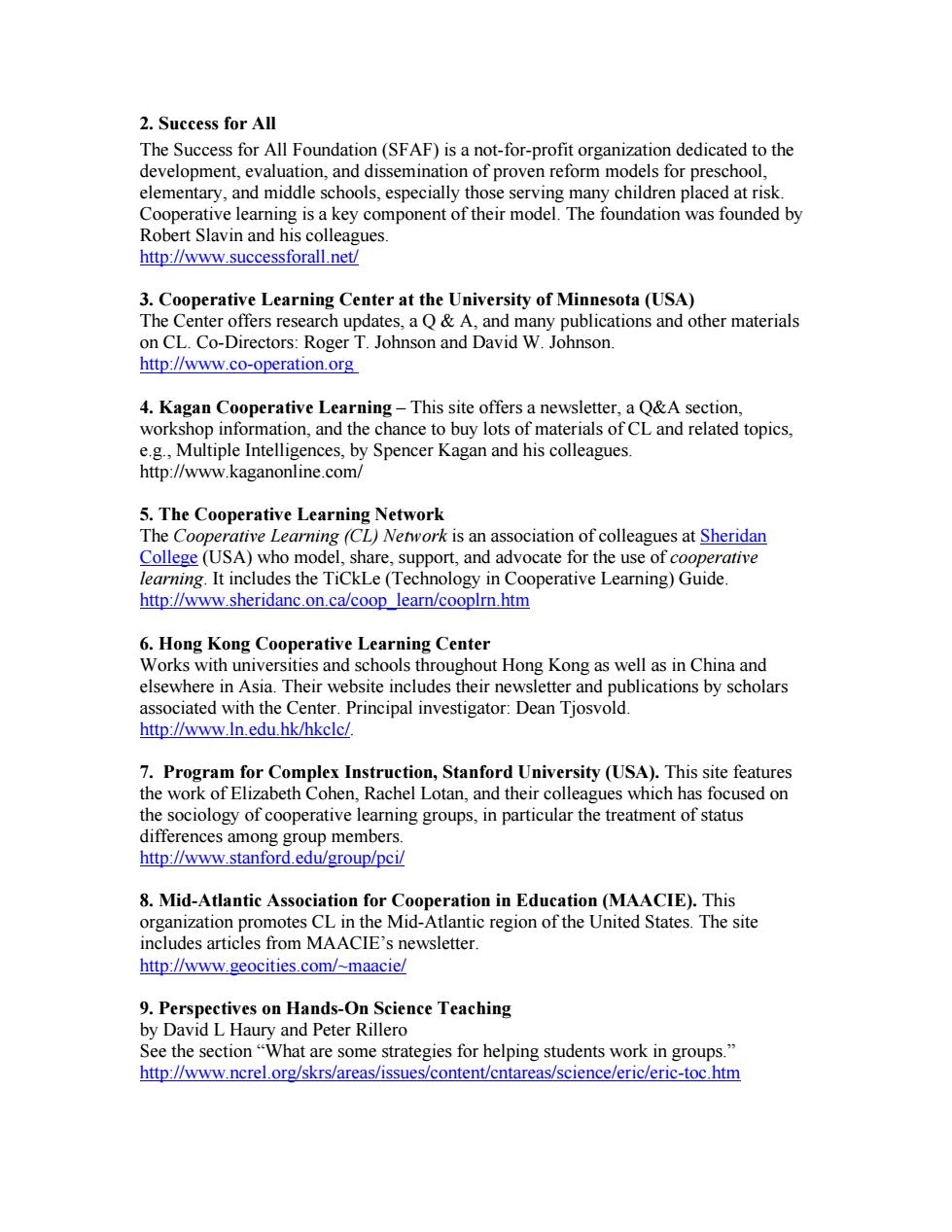正在加载图片...

2.Success for All The Success for All Foundation(SFAF)is a not-for-profit organization dedicated to the va of proven reform m es elementa nd mid ools,especially ren pla isk operat key component of their model.The foundation was founded by http://www.successforall.net/ 3.Cooperative Learning Center at the University of Minnesota(USA) The Center offers research updates,a Q&A,and many publications and other materials on CL.Co-Directors:Roger T.Johnson and David W.Johnson. http://www.co-operation.org 4.Kagan Cooperative Learning-This site offers a newsletter,a Q&A section, workshop information,and the chance to buy lots of materials of CL and related topics. e.g.,Multiple Intelligences,by Spencer Kagan and his colleagues. http://www.kaganonline.com/ 5.The Coop erative learning network The Coc (CL)Nenvork is an association of collea ues at Sheridan College (USA) odel sha rt o m vocate for the use of rative ooperative earning)Gu http://www.sheridanc.on.ca/coop_learn/cooplrn.ht 6.Hong Kong Cooperative Learning Center Works with univers ties and schools throughout Hong Kong as well as in China and elsewhere in Asia.Their website includes their newsletter and publications by scholars associated with the Center.Principal investigator:Dean Tjosvold. http://www.In.edu.hk/hkclc/. 7.Program for Complex Instruction,Stanford University(USA).This site features the work of Elizabeth Cohen,Rachel Lotan,and their colleagues which has focused on the sociology of cooperative learning groups,in particular the treatment of status differences among group members. http://www.stanford.edu/group/pci/ 8.Mid-Atlantic Association for Cooperation in Education (MAACIE).This organization promotes CL in the Mid-Atlantic region of the United States.The site includes articles fro m mAacIe's newsletter http://www.geocities.com/-maacie/ 9.Perspe es on Hands-On Science Teaching by David I See the sectior are some strategies for helping students work in groups. http://www.ncrel.org/skrs/areas/issues/content/cntareas/science/eric/eric-toc.htm2. Success for All The Success for All Foundation (SFAF) is a not-for-profit organization dedicated to the development, evaluation, and dissemination of proven reform models for preschool, elementary, and middle schools, especially those serving many children placed at risk. Cooperative learning is a key component of their model. The foundation was founded by Robert Slavin and his colleagues. http://www.successforall.net/ 3. Cooperative Learning Center at the University of Minnesota (USA) The Center offers research updates, a Q & A, and many publications and other materials on CL. Co-Directors: Roger T. Johnson and David W. Johnson. http://www.co-operation.org 4. Kagan Cooperative Learning – This site offers a newsletter, a Q&A section, workshop information, and the chance to buy lots of materials of CL and related topics, e.g., Multiple Intelligences, by Spencer Kagan and his colleagues. http://www.kaganonline.com/ 5. The Cooperative Learning Network The Cooperative Learning (CL) Network is an association of colleagues at Sheridan College (USA) who model, share, support, and advocate for the use of cooperative learning. It includes the TiCkLe (Technology in Cooperative Learning) Guide. http://www.sheridanc.on.ca/coop_learn/cooplrn.htm 6. Hong Kong Cooperative Learning Center Works with universities and schools throughout Hong Kong as well as in China and elsewhere in Asia. Their website includes their newsletter and publications by scholars associated with the Center. Principal investigator: Dean Tjosvold. http://www.ln.edu.hk/hkclc/. 7. Program for Complex Instruction, Stanford University (USA). This site features the work of Elizabeth Cohen, Rachel Lotan, and their colleagues which has focused on the sociology of cooperative learning groups, in particular the treatment of status differences among group members. http://www.stanford.edu/group/pci/ 8. Mid-Atlantic Association for Cooperation in Education (MAACIE). This organization promotes CL in the Mid-Atlantic region of the United States. The site includes articles from MAACIE’s newsletter. http://www.geocities.com/~maacie/ 9. Perspectives on Hands-On Science Teaching by David L Haury and Peter Rillero See the section “What are some strategies for helping students work in groups.” http://www.ncrel.org/skrs/areas/issues/content/cntareas/science/eric/eric-toc.htm